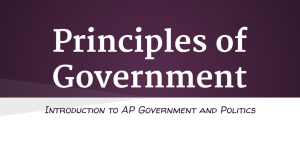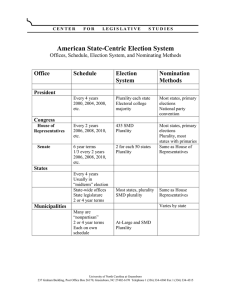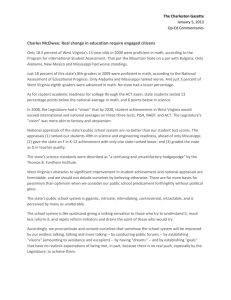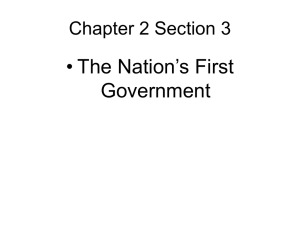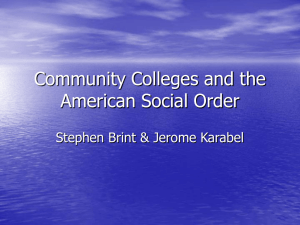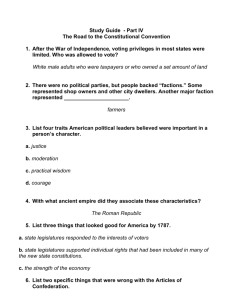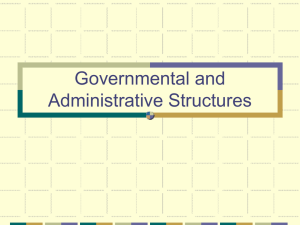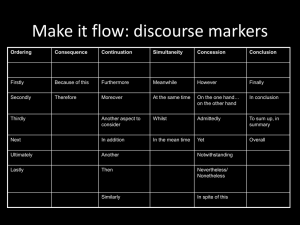Federalists' Supporters Energy in the Executive, # 70 (Hamilton
advertisement
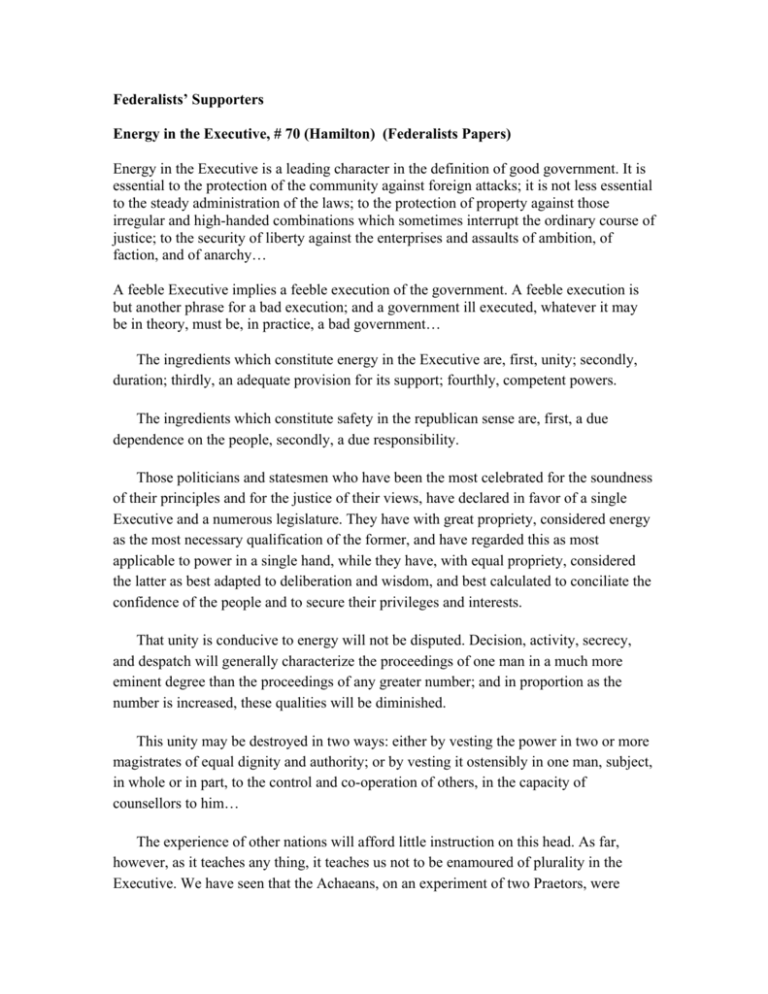
Federalists’ Supporters Energy in the Executive, # 70 (Hamilton) (Federalists Papers) Energy in the Executive is a leading character in the definition of good government. It is essential to the protection of the community against foreign attacks; it is not less essential to the steady administration of the laws; to the protection of property against those irregular and high-handed combinations which sometimes interrupt the ordinary course of justice; to the security of liberty against the enterprises and assaults of ambition, of faction, and of anarchy… A feeble Executive implies a feeble execution of the government. A feeble execution is but another phrase for a bad execution; and a government ill executed, whatever it may be in theory, must be, in practice, a bad government… The ingredients which constitute energy in the Executive are, first, unity; secondly, duration; thirdly, an adequate provision for its support; fourthly, competent powers. The ingredients which constitute safety in the republican sense are, first, a due dependence on the people, secondly, a due responsibility. Those politicians and statesmen who have been the most celebrated for the soundness of their principles and for the justice of their views, have declared in favor of a single Executive and a numerous legislature. They have with great propriety, considered energy as the most necessary qualification of the former, and have regarded this as most applicable to power in a single hand, while they have, with equal propriety, considered the latter as best adapted to deliberation and wisdom, and best calculated to conciliate the confidence of the people and to secure their privileges and interests. That unity is conducive to energy will not be disputed. Decision, activity, secrecy, and despatch will generally characterize the proceedings of one man in a much more eminent degree than the proceedings of any greater number; and in proportion as the number is increased, these qualities will be diminished. This unity may be destroyed in two ways: either by vesting the power in two or more magistrates of equal dignity and authority; or by vesting it ostensibly in one man, subject, in whole or in part, to the control and co-operation of others, in the capacity of counsellors to him… The experience of other nations will afford little instruction on this head. As far, however, as it teaches any thing, it teaches us not to be enamoured of plurality in the Executive. We have seen that the Achaeans, on an experiment of two Praetors, were induced to abolish one. The Roman history records many instances of mischiefs to the republic from the dissensions between the Consuls, and between the military Tribunes, who were at times substituted for the Consuls… But quitting the dim light of historical research, attaching ourselves purely to the dictates of reason and good se se, we shall discover much greater cause to reject than to approve the idea of plurality in the Executive, under any modification whatever. Wherever two or more persons are engaged in any common enterprise or pursuit, there is always danger of difference of opinion. If it be a public trust or office, in which they are clothed with equal dignity and authority, there is peculiar danger of personal emulation and even animosity. From either, and especially from all these causes, the most bitter dissensions are apt to spring. Whenever these happen, they lessen the respectability, weaken the authority, and distract the plans and operation of those whom they divide. If they should unfortunately assail the supreme executive magistracy of a country, consisting of a plurality of persons, they might impede or frustrate the most important measures of the government, in the most critical emergencies of the state. And what is still worse, they might split the community into the most violent and irreconcilable factions, adhering differently to the different individuals who composed the magistracy. It is evident from these considerations, that the plurality of the Executive tends to deprive the people of the two greatest securities they can have for the faithful exercise of any delegated power, first, the restraints of public opinion, which lose their efficacy, as well on account of the division of the censure attendant on bad measures among a number, as on account of the uncertainty on whom it ought to fall; and, secondly, the opportunity of discovering with facility and clearness the misconduct of the persons they trust, in order either to their removal from office or to their actual punishment in cases which admit of it. Federalist # 51 (Federalist Papers) On a Just Partition of Power (Hamilton or Madison) To what expedient, then shall we finally resort, for maintaining in practice the necessary partition of power among the several departments, as laid down in the Constitution? The only answer that can be given is, that as all these exterior provisions are found to be inadequate, the defect must be supplied, by so contriving the interior structure of the government as that its several constituent parts may, by their mutual relations, be the means of keeping each other in their proper places… But the great security against a gradual concentration of the several powers in the same department, consists in giving to those who administer each department the necessary constitutional means and personal motives to resist encroachments of the others. The provision for defence must in this, as in all other cases be made commensurate to the danger of attack. Ambition must be made to counteract ambition…It may be a reflection on human nature, that such devices should be necessary to control the abuses of government. But what is government itself, but the greatest of reflections on human nature? If men were angels, no government would be necessary. If angels were to govern men, neither external nor internal controls on government would be necessary. In framing a government which to be administered by men over men, the great difficulty lies in this: you must first enable the government to control the governed; and in the next place oblige it to control itself. A dependence on the people is not doubt, the primary control on the government; but experience has taught mankind the necessity of auxiliary precautions… But it is not possible to give to each department an equal power of self-defence. In republican government, the legislative authority necessarily predominates. The remedy for this inconveniency is to divide the legislature into different brances; and to render them, by different modes of election and different principles of action, as little connected with each other as the nature of their common functions and their common dependence on the society will admit….As the weight of the legislative authority requires it should be thus divided, the, the weakness of the executive may require, on the other hand, that it should be fortified. An absolute negative on the legislature appears, at first view, to be the natural defence with which the executive magistrate should be armoured… In the compound republic of America, the power surrendered yet the people is first divided between two distinct governments, and then the portion allotted to each subdivided among distinct and separate departments. Hence a double security arises to the rights of the people. The different governments will control each other, at the same time that each will be controlled by itself. Letter from Thomas Jefferson To James Madison Paris, Dec.20, 1787 What he likes about the Constitution: …The season admitting only of operations in the Cabinet, and these being in a great measure secret , I have little to fill a letter. I will therefore make up the deficiency by adding a few words on the Constitution proposed by our Convention. I like much the general idea of framing a government which should go on of itself peaceably, without needing continual recurrence to the state legislatures. I like the organization of the government into Legislative, Judiciary & Executive. I like the power given the Legislature to levy taxes, and for that reason solely approve of the greater house being chosen by the people directly. For tho' I think a house chosen by them will be very illy qualified to legislate for the Union, for foreign nations &c. yet this evil does not weigh against the good of preserving inviolate the fundamental principle that the people are not to be taxed but by representatives chosen immediately by themselves. I am captivated by the compromise of the opposite claims of the great & little states, of the latter to equal, and the former to proportional influence. I am much pleased too with the substitution of the method of voting by persons, instead of that of voting by states: and I like the negative given to the Executive with a third of either house, though I should have liked it better had the Judiciary been associated for that purpose, or invested with a similar and separate power.
